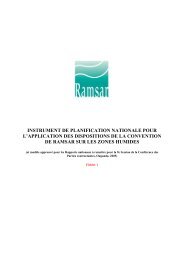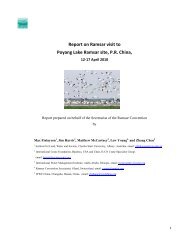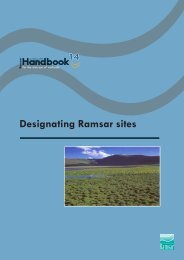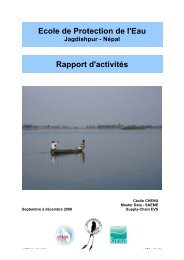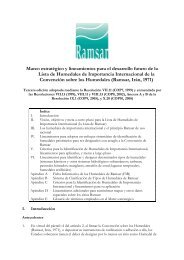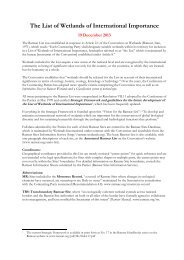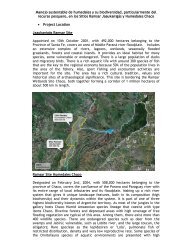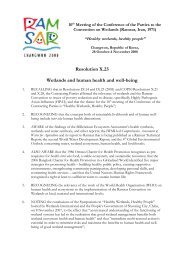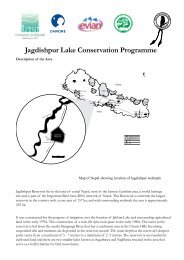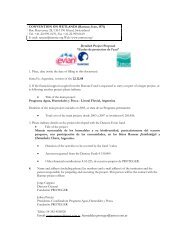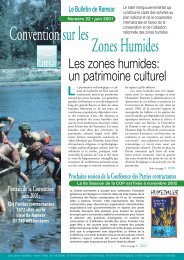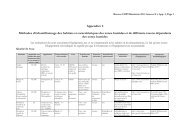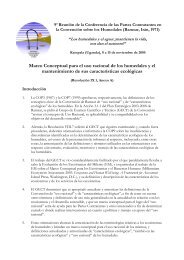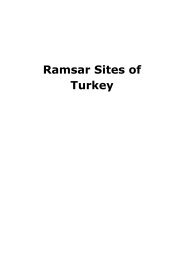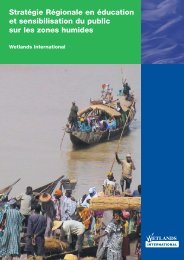Okavango Delta Management Plan - Ramsar Convention on Wetlands
Okavango Delta Management Plan - Ramsar Convention on Wetlands
Okavango Delta Management Plan - Ramsar Convention on Wetlands
You also want an ePaper? Increase the reach of your titles
YUMPU automatically turns print PDFs into web optimized ePapers that Google loves.
2 = Moderate social benefits<br />
3 = Low social benefits<br />
Ec<strong>on</strong>omic and financial returns<br />
1 = High ec<strong>on</strong>omic/financial returns<br />
2 = Moderate ec<strong>on</strong>omic returns<br />
3 = Low ec<strong>on</strong>omic returns<br />
Projects which score higher should be discouraged and it is also recommended that<br />
the three criteri<strong>on</strong> be weighted to enhance decisi<strong>on</strong> making process. Projects which<br />
would c<strong>on</strong>tribute to the maintenance of the wetland ecosystem should carry a<br />
higher weight.<br />
3.7.2.5 Dem<strong>on</strong>strati<strong>on</strong>s/Pilot activities<br />
The hotspots approach is a method used to identify ideas which canbe tested in<br />
pilot projects that address some of the key issues. The approach in this respect<br />
took into c<strong>on</strong>siderati<strong>on</strong> the following key elements: devolvement of management<br />
resp<strong>on</strong>sibilities to communities, capacity building, enhanced level of understanding<br />
of the ecosystem dynamics, potential for sustainability, enhanced livelihood status,<br />
potential for resolving c<strong>on</strong>flicts, opportunities for learning and replicati<strong>on</strong>. Table<br />
3-6 and Figure 3-1 describe and illustrate the ten chosen interventi<strong>on</strong>s and their<br />
locati<strong>on</strong>s respectively.<br />
Table 3-6: Pilot projects to test management opti<strong>on</strong>s<br />
Theme Key Issues Proposed Pilot Sites<br />
Improved Fisheries<br />
<str<strong>on</strong>g>Management</str<strong>on</strong>g><br />
98<br />
C<strong>on</strong>flict emanating from uncoordinated use of comm<strong>on</strong> fishing grounds<br />
by both commercial and angling lodges as well as the percepti<strong>on</strong>s <strong>on</strong><br />
the status of the <str<strong>on</strong>g>Okavango</str<strong>on</strong>g> fish stocks. An improved fisheries<br />
management system will be developed and tested which will include<br />
c<strong>on</strong>flict resoluti<strong>on</strong> and m<strong>on</strong>itoring of fish stocks.<br />
Veld Resources <str<strong>on</strong>g>Management</str<strong>on</strong>g> Veld product harvesting for both commercial and subsistence use in<br />
c<strong>on</strong>cessi<strong>on</strong> and communal areas is highly unregulated and as a result<br />
creates c<strong>on</strong>flict am<strong>on</strong>g users. The c<strong>on</strong>flict leads to over-harvesting of<br />
resources and hence impacts negatively <strong>on</strong> biodiversity.<br />
Riparian Woodland M<strong>on</strong>itoring<br />
(Interventi<strong>on</strong> by OWBC<br />
project<br />
M<strong>on</strong>itoring of the tourism<br />
impacts<br />
There is a c<strong>on</strong>cern that riparian woodlands are being affected by<br />
anthropogenic factors, herbivory and other natural processes such as<br />
climate change. A pilot project to establish baseline, m<strong>on</strong>itoring indices<br />
and carry out m<strong>on</strong>itoring of riparian woodlands (recruitment rates,<br />
structure, compositi<strong>on</strong>, crown cover, etc.) will be developed to address<br />
this c<strong>on</strong>cern. M<strong>on</strong>itoring is to be carried out by the tourism<br />
establishments and local communities.<br />
The Governement of Botswana (through the ODMP) will provide funds<br />
to develop a comprehensive District Tourism Strategy that<br />
encompasses tourism guidelines, and Limits to Acceptable Change<br />
(LAC) criteria. GEF funded BIOKAVANGO project will complement the<br />
tourism private sector and GOB resources to strengthen capacity of the<br />
tour operators to incorporate biodiversity c<strong>on</strong>siderati<strong>on</strong>s in systematic<br />
m<strong>on</strong>itoring of impacts and adapt management practices at the CHA<br />
and district level. This will include identificati<strong>on</strong> of biodiversity indices<br />
and training of tour operator pers<strong>on</strong>nel in m<strong>on</strong>itoring. In community<br />
c<strong>on</strong>cessi<strong>on</strong> areas m<strong>on</strong>itoring is already being carried by DWNP through<br />
<str<strong>on</strong>g>Management</str<strong>on</strong>g> Oriented M<strong>on</strong>itoring Systems (MOMS) which are being<br />
piloted in community managed CHAs.<br />
Panhandle up to<br />
Samochima<br />
1. Tubu/area NG 25<br />
2. Shorobe/area NG 32<br />
1. al<strong>on</strong>g the Boro River<br />
2. Chitabe/Santawane area<br />
(Gomoti/Santantadibe<br />
channels)<br />
Sites to be agreed up<strong>on</strong><br />
with the tourism operati<strong>on</strong>s



